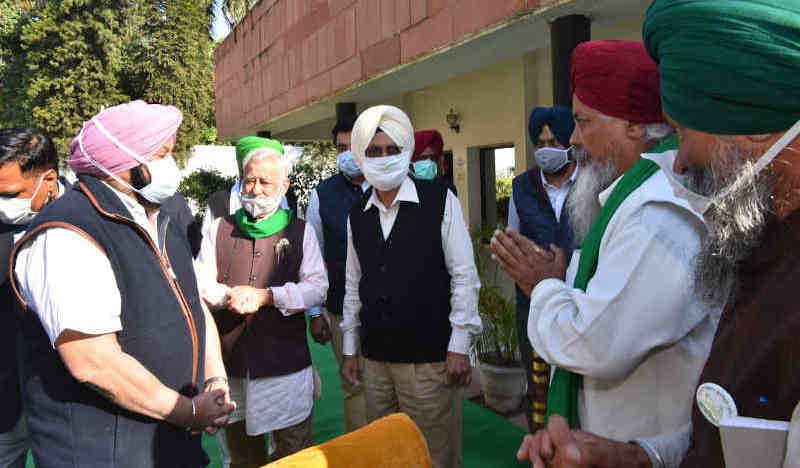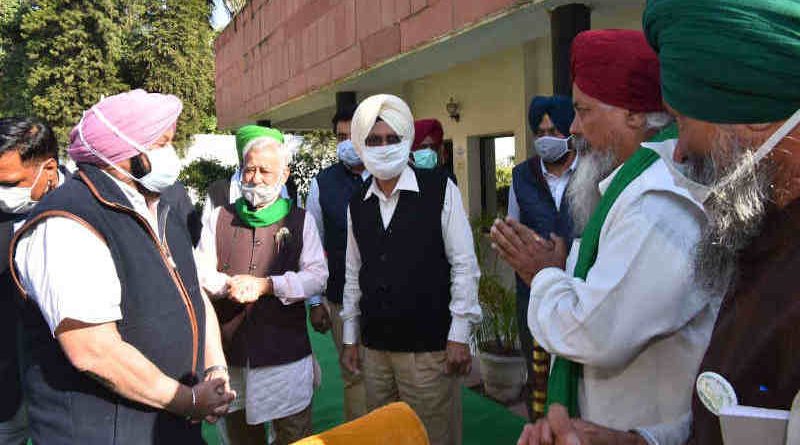Protesting Punjab Farmers Succumb, Lift Train Blockade

Although the farmers’ protests against the new farm laws have largely failed, farmers have announced to hold demonstrations in New Delhi on November 26 and 27.
By Rakesh Raman
Punjab farmers – who had blocked trains as part of their protest against the new farm laws – have finally succumbed, as they have decided to end the train blockade.
While it was supposed to be an all-India protest, in the absence of sufficient participation from other states, the Punjab farmers are gradually yielding under the government’s diktats and diluting their demands.
After a meeting today (November 21) in Chandigarh with Punjab’s chief minister (CM) Amarinder Singh, the leaders of about 30 farmers’ unions have agreed to allow both passenger and freight trains to run in the state.
However, the unions have warned that if their demands are not met within 15 days, they will block the trains again. Their decision has come after CM Amarinder Singh had expressed his displeasure with the farmers’ protests on railway tracks.
[ Also Read: Modi Govt Manipulates EVMs to Win Elections: Akal Takht Chief ]
“Had a fruitful meeting with Kisan (farmer) Unions. Happy to share that starting 23rd November night, Kisan Unions have decided to end rail blockades for 15 days. I welcome this step since it will restore normalcy to our economy. I urge Central Govt to resume rail services to Punjab forthwith,” tweeted CM Amarinder Singh.
Had a fruitful meeting with Kisan Unions. Happy to share that starting 23rd Nov night, Kisan Unions have decided to end rail blockades for 15 days. I welcome this step since it will restore normalcy to our economy. I urge Central Govt to resume rail services to Punjab forthwith. pic.twitter.com/shmIZPHFR0
— Capt.Amarinder Singh (@capt_amarinder) November 21, 2020
In September, the Indian Railways had suspended the movement of goods trains in Punjab after the local farmers had launched an indefinite “rail roko” (stop trains) protest against the farm bills introduced by the government headed by Prime Minister (PM) Narendra Modi.
Of late, the Modi government has passed 3 connected Bills to make them laws. These are: the Farmers’ Produce Trade and Commerce (Promotion and Facilitation) Bill, Farmers (Empowerment and Protection) Agreement of Price Assurance and Farm Services Bill, and the Essential Commodities (Amendment) Bill.
Currently, some farmers in India are protesting against the Modi government and the new laws. Farmers fear that these laws will deprive them of their farming rights and they will lose their lands which will be grabbed by Modi’s capitalist friends.
Although a few farmers across the nation oppose Modi government’s decision, the epicenter of the dwindling movement is Punjab which contributes the lion’s share to the Indian agriculture sector.
In fact, the farmers’ protests against the new farm laws have largely failed, but farmers have announced to hold demonstrations in New Delhi on November 26 and 27.
However, the Delhi Police – which is controlled by the Modi government – has denied permission to farmers with the excuse that the farmers’ gathering will spread coronavirus in Delhi.
The Modi government has refused to withdraw the farm laws and Modi has accused the opposition parties of misleading farmers who are protesting against these laws.
Meanwhile, CM Amarinder Singh has decided to meet India’s Home Minister Amit Shah and PM Modi next week – beginning November 23 – to demand the resumption of rail services in Punjab.
By Rakesh Raman, who is a national award-winning journalist and social activist. He is the founder of a humanitarian organization RMN Foundation which is working in diverse areas to help the disadvantaged and distressed people in the society.





